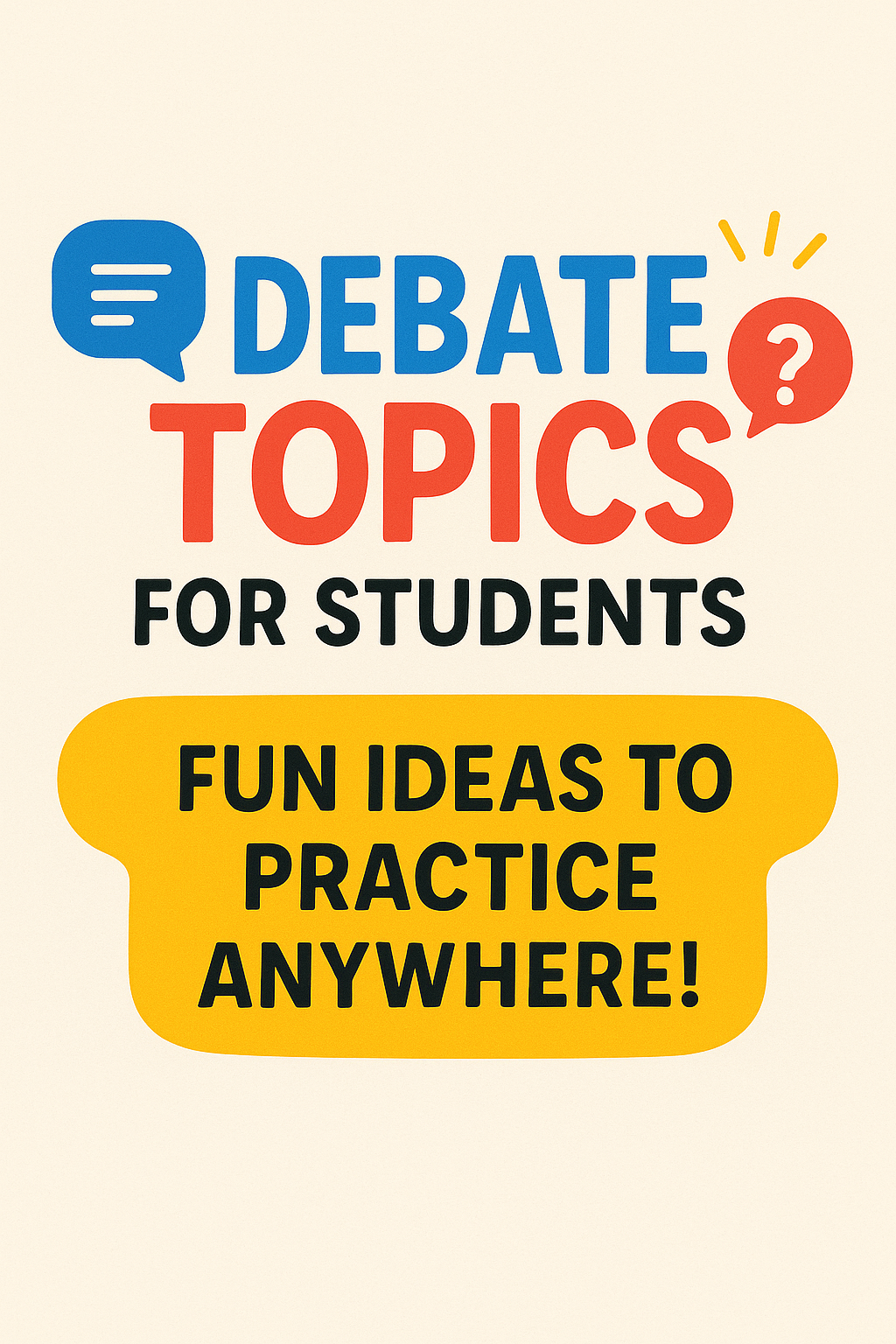Debate Topics for Students: Fun Ideas to Practice Anywhere!
Looking for debate topics for students that spark creativity and sharpen your skills? Setting up quality lists is one of our favorite things to do for students. (Yes, we know it’s a bit nerdy, but let’s do it!)
It’s great in so many scenarios. Are you gearing up for a competition, practicing with friends, or just want to stage an epic living-room battle (intellectual battle, of course? Then you’ve landed in the right place.
Debating is awesome! Ok we might be biased, but if you don’t believe us there are so many articles on the positive effects of debate. Find one of them here!
You can simply look at a couple of topics to improve your thinking, speaking, and teamwork anytime, anywhere.
Grab your notebook, call your friends, or rally your debate group, because it’s time to dive into some seriously fun topics!
Why Practicing Debate at Home or with Friends is a Game-Changer
Practice makes perfect. Debating is no exception. Many pros, academics or ambitious professionals are going outside of official rounds to get better fast. Here’s why:
- Zero pressure = more creativity
- More laughs = better memories
- Different settings = sharper thinking
Practicing casually at home, in study groups, or even during lunch breaks helps students think on their feet, listen actively, and build strong arguments without feeling like they’re on trial.
How to Pick the Right Debate Topics for Students
When picking debate topics for students, you want ideas that are:
- Simple to understand but deep enough to spark real discussion
- Relatable to everyday life
- Fun (yes, fun—no one wants to debate “The Merits of Tax Reform” during pizza night)
Ready? Let’s go.
20 Fun and Unique Debate Topics for Students
These topics are designed for casual practice—at home, at school, or even in your group chat:
- Is cancel culture positive for society?
- Is it better to be smart or funny?
- Would living on Mars be cooler than living on Earth?
- Should students design their own school curriculum?
- Is it better to be rich and unhappy or poor and joyful?
- Do video games teach valuable skills?
- Should schools have nap time after lunch?
- Is summer vacation too long?
- Are cats better than dogs?
- Should school cafeterias serve fast food?
- Is reading books better than watching movies?
- Would time travel be a blessing or a curse?
- Should students have a say in choosing their teachers?
- Is TikTok educational or distracting?
- Should zoos be banned?
- Would you rather be able to fly or be invisible?
- Is technology making our lives easier or harder?
- Should all students learn how to cook in school?
- Would life be better without money?
- Should homework be replaced by real-world projects?
Each of these topics can go deep or stay light—perfect for quick-fire debates, serious discussions, or even friendly “mic drop” moments.
Fun Ways to Practice Debate at Home or With Friends
Now that you have your topics, here are some fun ways to practice:
1. Debate Dinner
Everyone picks a topic and debates it over a meal. (Winner gets the last slice of pizza!)
2. Two-Minute Battles
Set a timer—each side has exactly two minutes to argue. Quick, intense, and hilarious.
3. Role-Reversal Debates
Argue against your real opinion! It builds empathy, flexibility, and mega brain power.
4. Team Tournaments
Create mini-tournaments with your debate group. Even a small prize, like candy or bragging rights, makes it thrilling.
5. Debate Jar
Write debate topics on slips of paper, toss them into a jar, and pick one at random. No prep allowed—pure improvisation!
Pro Tips to Supercharge Your Practice
Want to level up your home or group debates? Here’s how:
- Time yourself: Practicing under time pressure sharpens your thinking.
- Record yourself: Watching replays helps you spot filler words (“um,” “like”) and improve delivery.
- Practice rebuttals: Debating isn’t just about speaking; it’s about listening and responding.
- Switch sides: Arguing both sides trains you to see every angle—and that’s real debate mastery.
Debate Practice is a Superpower
Mastering debate is like building a superpower. you’ll learn to think faster, speak better, and solve problems smarter.
Debating has a powerful impact on the brain, enhancing critical thinking, memory, emotional regulation, and cognitive flexibility. Regularly engaging in debate strengthens the prefrontal cortex, which is responsible for decision-making and analytical thinking. It also improves the brain’s ability to process opposing viewpoints, fostering empathy and adaptability. Research shows that debating can lead to better academic performance and long-term mental agility. Simply put, debating trains your mind to think sharper, faster, and more creatively!
So pick a few of these debate topics for students, grab some friends, and let the great debate begin!


